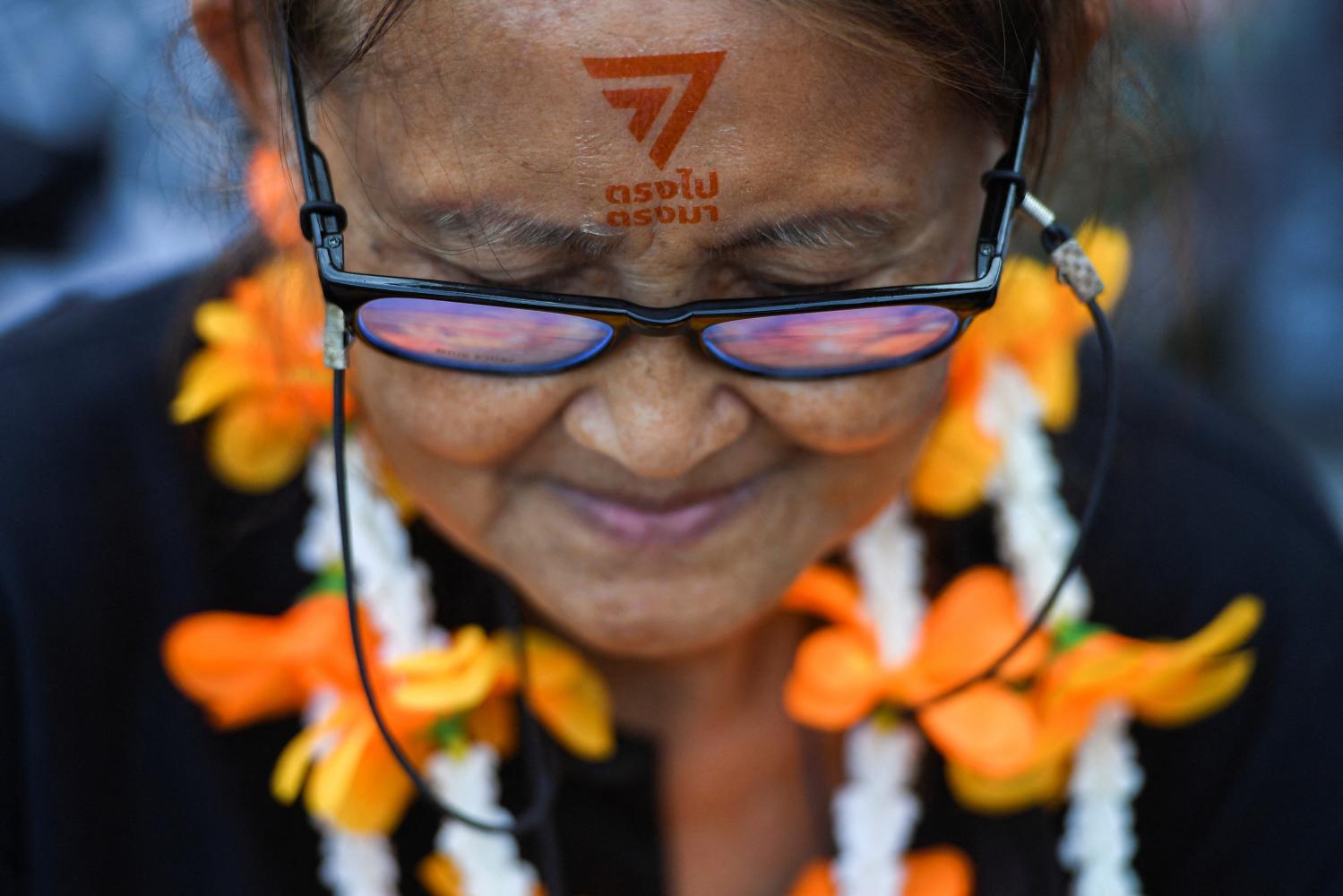
Thailand's poll-leading Pheu Thai Party (PTP) is fighting a war it has already won. Consequently, its pledged freebie of 10,000 baht in a digital wallet for Thai people is superfluous and unnecessary. As the populism war has run its course, a new battleground revolving around the reform and adjustment of traditional centres of power is emerging. The fight in this new battle, being led by the Move Forward Party (MFP), is likely to last into the foreseeable future as the next stage in Thailand's modernisation imperative in the 21st century.
Pheu Thai's controversial 10,000-baht scheme is aimed at Thais 16 years and older to spend within six months and in a 4-kilometre radius of their homes as registered on their ID cards. The idea is to pump-prime the Thai economy with a bang rather than drips and drops, as Prime Minister Prayut Chan-o-cha's government has done over the past several years with co-payment subsidy programmes and occasional piecemeal financial aid.
Pheu Thai, similar to its dissolved precursors Thai Rak Thai and Palang Prachachon (People's Power) parties, is fond of multiplier effects at the grassroots level. Their aim is to generate local spending, which would automatically multiply into further rounds of purchase demand, thereby boosting consumption from below and uplifting economic growth on aggregate. Although its logic is sound, its timing is off, and the strategy behind it is way off.
A big-bang boost would have been more suitable and effective earlier, perhaps when the Covid-19 pandemic began to subside early last year. As recovery picks up, it would be more optimal to boost confidence and create the enabling conditions to promote investment, consumption, innovation and competitiveness. Pheu Thai's policy offer to get Thai trade policy going again with free trade agreements is a step in the right direction but is lacking in focus and attention.
Instead, the 10,000-baht scheme has become a major distraction for Pheu Thai. Its leaders are compelled to explain time and again how this complicated spending plan would work, where its funds would come from, and when it could start. The laws required to make it happen are onerous, and its planned launch on Jan 1 next year could be delayed. There has been so much uncertainty and so many questions that the scheme seems misplaced.
Because of its blatantly populist tone, trying to outcompete other parties' populist platforms, the 10,000-baht idea has further accentuated Thailand's societal divisions. Agitated reactionaries and conservatives see it as fiscal profligacy and as yet another gimmicky intoxication of the masses in the old ways of Thai Rak Thai and Palang Prachachon, led by Pheu Thai'sde facto and exiled leader Thaksin Shinawatra and his policy team.
It is now evident in Thai politics that the populism war is finished. All contesting parties in the upcoming poll on May 14 are overtly populist with tangible pledges to spend more on people's welfare and to give them more career opportunities, effectively emulating Thai Rak Thai two decades ago. When Thaksin started the populism war to turn attention to the poor and the needy more than two decades ago in order to win votes, he was on the losing end, accused of fiscal irresponsibility and misleading the masses, before being ousted by a military coup in September 2006. A similar fate befell his sister Yingluck Shinawatra with her government's rice-pledging scheme, ending with another military takeover in May 2014.
But now even the pro-military United Thai Nation (UTN) and Palang Pracharath (PPRP) parties are shamelessly populist, even trying to outdo Pheu Thai in populism. It has taken 20 years for Thai elites to own up to the country's income divide and economic inequality after willful neglect over many decades. Now the poor and the disadvantaged are getting a fairer shake.
As this election is crucially about getting rid of the governing conservative-royalist regime, Pheu Thai would have done better to focus on undoing the damage and regaining Thailand's footing after the Prayut years. The Thai people are now well accustomed to populist and welfare measures, which have become routine in policy considerations and governance. What they want to see in addition to Gen Prayut's back are more pro-growth policies, policy innovations and Thailand's way forward in the region and the wider world.
Enabling such a forward path requires fundamental reforms and adjustments of Thailand's institutional setting and political order within a constitutional framework. The new battleground is thus about reforming traditional institutions to the structure of the economy and government. Unsurprisingly, the MFP's three-pronged slogan to "de-militarise, de-monopolise and decentralise" is taking the electoral field by storm.
Also previously dissolved when it started out as Future Forward Party, the MFP is putting up a daring and defiant election campaign. Its policy platform, as advertised on its website, is the most coherent and comprehensive, striking at the heart of entrenched vested interests. No party has come anywhere near the MFP's call for military and monarchy reforms, cutting the armed forces' budget, getting rid of conscription, electing provincial governors directly and amending the lese majeste law, or Section 112. These are accompanied by taxes on land holdings and big businesses, diverting proceeds to elderly pensions, education and an assortment of welfare policies.
Even though the MFP is gaining traction and momentum, its bold campaign is likely to be a daunting uphill task. If it wins big at the poll, it could be dissolved again by the powers-that-be on one pretext or another. There could also be other ways of manipulation and subversion to keep the MFP down. What the MFP is doing today is similar to what Thai Rak Thai did two decades ago, opening up the system and bringing Thailand into the 21st century. It will likely take a lot more time than anticipated, with potentially more instability, before the new battle will see its conclusion the way we have seen how the populism war has been won.







